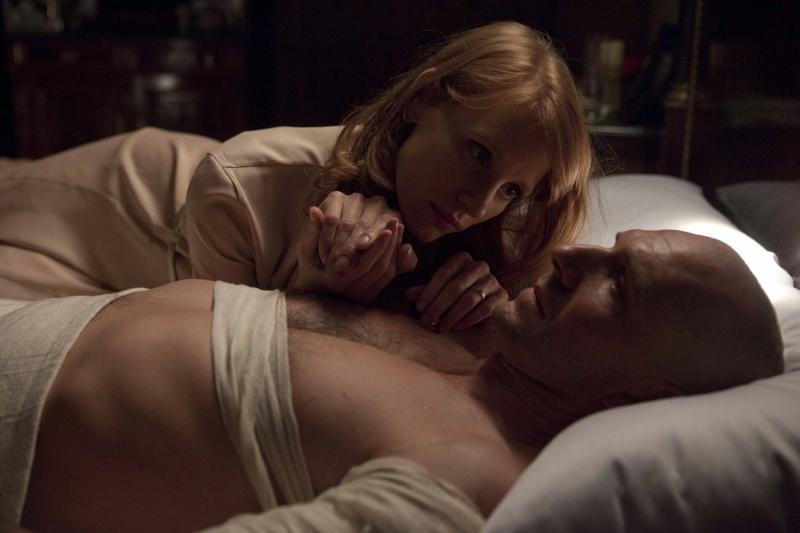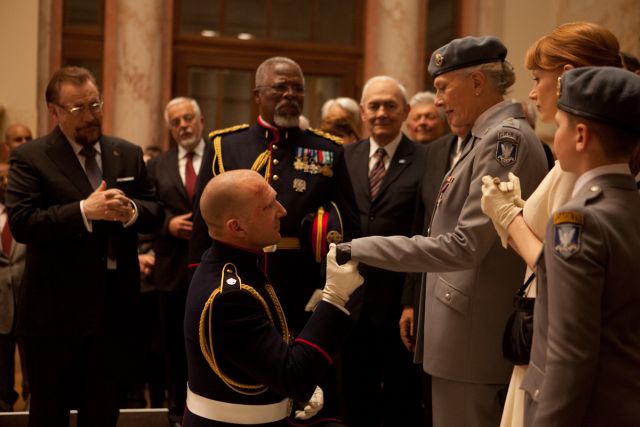Coriolanus | reviews, news & interviews
Coriolanus
Coriolanus
Ralph Fiennes brings Shakespeare's bellicose mama's boy to the screen, with Vanessa Redgrave as mum

Ralph Fiennes' commitment to the theatre, not least the classical repertoire, has long been a source of wonder, bringing legions of Voldemort followers to see him live, most recently as a movingly hirsute, brooding Prospero in an otherwise heavy-going account of The Tempest. So Fiennes deserves double credit for transmuting the Bardic passions that launched him on stage to the global marketplace of the screen, especially with a title that exists some way from the Hamlet
How, then, is Fiennes's directorial debut as Caius Martius, aka the eponymous Coriolanus, which finds the actor self-cast in a contemporary rendering of the fierce-eyed killing machine who is brought to heel pretty much only by his mother, Volumnia? Fiennes played the role on stage in 2000 for the Almeida during its tenure at the old Gainsborough Studios in an operatic production that boasted a scorching supporting turn from stage veteran Barbara Jefford as Shakespeare's most imposing of mums. And so it is on screen that Vanessa Redgrave's steely, stiff-backed presence in that same part would all but walk off with the film were Fiennes's intensity not every bit as voluble as his way with the language. Think of the result as Rambo (or more precisely, given the talent involved, The Hurt Locker) that marches to an iambic beat.
 Fiennes, of course, had a vivid cameo in the Kathryn Bigelow Oscar-winner, so it's not surprising that he has co-opted several of the earlier movie's best technicians to help him this time round (cinematographer Barry Ackroyd preeminently). Set in a decidedly Balkanised version of Rome, the action in Fiennes's narrative couples Shakespeare as filleted by the American screenwriter and playwright John Logan (Red, Hugo) with the sort of violence, both promised and actual, designed to cater to the Gladiator brigade. (That film, indeed, was co-written by Logan.) In fact, it's something of a shock near the start of Coriolanus when the visuals give way to the verbal, all the more so because co-star Gerard Butler (pictured above as Aufidius) looks a lot happier sharpening a knife and glowering ominously than speaking lines like "I was moved withal". At which point, Coriolanus's Volscian nemesis might as well be ordering a venti cappuccino.
Fiennes, of course, had a vivid cameo in the Kathryn Bigelow Oscar-winner, so it's not surprising that he has co-opted several of the earlier movie's best technicians to help him this time round (cinematographer Barry Ackroyd preeminently). Set in a decidedly Balkanised version of Rome, the action in Fiennes's narrative couples Shakespeare as filleted by the American screenwriter and playwright John Logan (Red, Hugo) with the sort of violence, both promised and actual, designed to cater to the Gladiator brigade. (That film, indeed, was co-written by Logan.) In fact, it's something of a shock near the start of Coriolanus when the visuals give way to the verbal, all the more so because co-star Gerard Butler (pictured above as Aufidius) looks a lot happier sharpening a knife and glowering ominously than speaking lines like "I was moved withal". At which point, Coriolanus's Volscian nemesis might as well be ordering a venti cappuccino.
Fiennes's company of thesps, as it happens, is a singularly mixed bag, and I suppose it's scant surprise that few among them can match the flair for belligerent rhetoric that comes as second nature to Fiennes, Redgrave, and also Brian Cox, here cast as the Roman senator, Menenius, who is visibly drained by the gathering fractiousness of the world around him. (I also liked the legendary South African actor John Kani as Coriolanus's commanding officer, Cominius.)
 That world is a strife-ridden modern landscape that allows both a news channel called Fidelis TV, if you please, as well as a glimpse of Jon Snow - though apparently not all that much in the way of "curs", to cite one of several slurs tossed by an ever-contemptuous Coriolanus in the direction of the Roman citizenry. The crowd scenes look startlingly under-populated whether or not one thinks of the "people power" that is chronicled with increasing regularity in the headlines these days, the play's gathering dissatisfaction with lack of corn fuelling the sort of rage to which one finds contemporary equivalents all the time. There's no denying, as with this material on stage, that Coriolanus's default mode - namely scorn - risks putting an audience off, and the film doesn't come with the benefit of being paired with the contrasting humanity of Richard II, a doubling that gave Fiennes's theatrical occupancy of both roles such a charge. (That said, some may be intrigued to find Fiennes here trying out the shaggy-maned look that he later brought to The Tempest, as borne out by Coriolanus's own journey from nostril-flaring skinhead to bearded, banished malcontent.)
That world is a strife-ridden modern landscape that allows both a news channel called Fidelis TV, if you please, as well as a glimpse of Jon Snow - though apparently not all that much in the way of "curs", to cite one of several slurs tossed by an ever-contemptuous Coriolanus in the direction of the Roman citizenry. The crowd scenes look startlingly under-populated whether or not one thinks of the "people power" that is chronicled with increasing regularity in the headlines these days, the play's gathering dissatisfaction with lack of corn fuelling the sort of rage to which one finds contemporary equivalents all the time. There's no denying, as with this material on stage, that Coriolanus's default mode - namely scorn - risks putting an audience off, and the film doesn't come with the benefit of being paired with the contrasting humanity of Richard II, a doubling that gave Fiennes's theatrical occupancy of both roles such a charge. (That said, some may be intrigued to find Fiennes here trying out the shaggy-maned look that he later brought to The Tempest, as borne out by Coriolanus's own journey from nostril-flaring skinhead to bearded, banished malcontent.)
The result is a film it's easier to admire than to warm to, though that may simply be in the nature of so singular and single-minded a figure at its core. As with Richard II, Coriolanus doesn't grant its leading man much time for romance, and a teary Jessica Chastain is hardly the first actress to fall at the underwritten hurdle of Virgilia, Coriolanus's cipher of a wife. Then again, you probably wouldn't want as a mother-in-law a flashing-eyed, clarion-voiced woman possessed of a profile one could imagine imprinted on a flag. If the film in the end works best as a Fiennes/Redgrave double-act, that may be no bad thing. (See the two pictured above, as John Kani looks on.) "Anger's my meat," Redgrave's Volumnia announces with a purr that could sink ships. "I sup on myself." Just as Fiennes and his movie feast on her.
Watch the trailer to Coriolanus
rating
Explore topics
Share this article
The future of Arts Journalism
You can stop theartsdesk.com closing!
We urgently need financing to survive. Our fundraising drive has thus far raised £49,000 but we need to reach £100,000 or we will be forced to close. Please contribute here: https://gofund.me/c3f6033d
And if you can forward this information to anyone who might assist, we’d be grateful.

Subscribe to theartsdesk.com
Thank you for continuing to read our work on theartsdesk.com. For unlimited access to every article in its entirety, including our archive of more than 15,000 pieces, we're asking for £5 per month or £40 per year. We feel it's a very good deal, and hope you do too.
To take a subscription now simply click here.
And if you're looking for that extra gift for a friend or family member, why not treat them to a theartsdesk.com gift subscription?
more Film
 London Film Festival - a Korean masterclass in black comedy and a Camus classic effectively realised
New films from Park Chan-wook, Gianfranco Rosi, François Ozon, Ildikó Enyedi and more
London Film Festival - a Korean masterclass in black comedy and a Camus classic effectively realised
New films from Park Chan-wook, Gianfranco Rosi, François Ozon, Ildikó Enyedi and more
 After the Hunt review - muddled #MeToo provocation
Julia Roberts excels despite misfiring drama
After the Hunt review - muddled #MeToo provocation
Julia Roberts excels despite misfiring drama
 Ballad of a Small Player review - Colin Farrell's all in as a gambler down on his luck
Conclave director Edward Berger swaps the Vatican for Asia's sin city
Ballad of a Small Player review - Colin Farrell's all in as a gambler down on his luck
Conclave director Edward Berger swaps the Vatican for Asia's sin city
 London Film Festival 2025 - Bradley Cooper channels John Bishop, the Boss goes to Nebraska, and a French pandemic
... not to mention Kristen Stewart's directing debut and a punchy prison drama
London Film Festival 2025 - Bradley Cooper channels John Bishop, the Boss goes to Nebraska, and a French pandemic
... not to mention Kristen Stewart's directing debut and a punchy prison drama
 London Film Festival - from paranoia in Brazil and Iran, to light relief in New York and Tuscany
'Jay Kelly' disappoints, 'It Was Just an Accident' doesn't
London Film Festival - from paranoia in Brazil and Iran, to light relief in New York and Tuscany
'Jay Kelly' disappoints, 'It Was Just an Accident' doesn't
 Iron Ladies review - working-class heroines of the Miners' Strike
Documentary salutes the staunch women who fought Thatcher's pit closures
Iron Ladies review - working-class heroines of the Miners' Strike
Documentary salutes the staunch women who fought Thatcher's pit closures
 Blu-ray: The Man in the White Suit
Ealing Studios' prescient black comedy, as sharp as ever
Blu-ray: The Man in the White Suit
Ealing Studios' prescient black comedy, as sharp as ever
 The Woman in Cabin 10 review - Scandi noir meets Agatha Christie on a superyacht
Reason goes overboard on a seagoing mystery thriller
The Woman in Cabin 10 review - Scandi noir meets Agatha Christie on a superyacht
Reason goes overboard on a seagoing mystery thriller
 London Film Festival 2025 - crime, punishment, pop stars and shrinks
Daniel Craig investigates, Jodie Foster speaks French and Colin Farrell has a gambling habit
London Film Festival 2025 - crime, punishment, pop stars and shrinks
Daniel Craig investigates, Jodie Foster speaks French and Colin Farrell has a gambling habit
 I Swear review - taking stock of Tourette's
A sharp and moving tale of cuss-words and tics
I Swear review - taking stock of Tourette's
A sharp and moving tale of cuss-words and tics
 A House of Dynamite review - the final countdown
Kathryn Bigelow's cautionary tale sets the nuclear clock ticking again
A House of Dynamite review - the final countdown
Kathryn Bigelow's cautionary tale sets the nuclear clock ticking again

Add comment